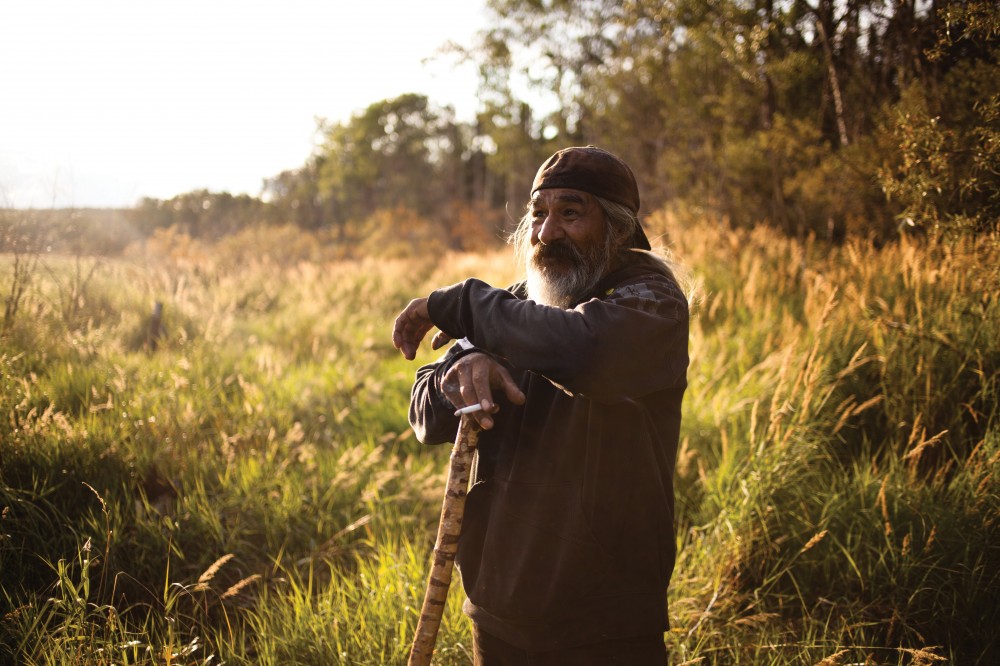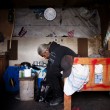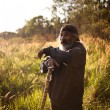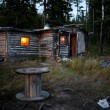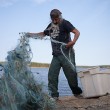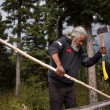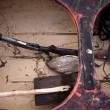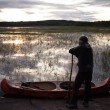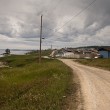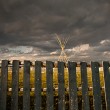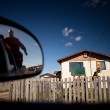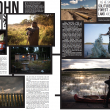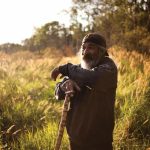Photos by Colin Vandenberg: Colin Vandenberg graduated from Praireview School of Photography, in Manitoba in 2003. He has travelled to distant corners of the world, photographing individuals and depicting their life stories. At some point along this journey, while traveling across Northern Manitoba, he met John François.
 Every morning, John François begins his day by turning on the radio, his most constant companion. The voices of the commentators, the music, and the advertisements fill the air of his cabin as he prepares for the day ahead. John François is good-humoured and light-hearted.
Every morning, John François begins his day by turning on the radio, his most constant companion. The voices of the commentators, the music, and the advertisements fill the air of his cabin as he prepares for the day ahead. John François is good-humoured and light-hearted.
He lives in a rudimentary lodge that his father left him, and survives on fishing, hunting and occasionally, trading what he catches at the nearest town. His cabin is located on the periphery of the Pukatawagan Reserve in Manitoba, half an hour away by canoe across the Churchill River. He enjoys the isolation and peacefulness of this remote area of the country because, as he says, the solitude, the forest, and the land are “healing.” It was precisely the need to heal that drove John François to take refuge far away, distancing himself from his own community.

John François grew up in Pukatawagan, home of the Mathias Colomb Cree Nation (MCCN), located about 800 kilometres north of Winnipeg. Also called “Puk” by the locals, this small community of only 2,000 people has no road access —except for a few months in the winter—and is only accessible by a bi-weekly local train or small plane.
Getting off the train in Puk is like stepping into open wilderness. The natural scenery surrounding the remote northern reserve is breathtaking, with beautiful lakes, dense forests, and a bewildering view of the Churchill River, one of the last pristine bodies of freshwater in the country, which flows from the foothills of the Rocky Mountains (Kichiwatchya) and pours into Hudson Bay (Kichkamek). However, not everything is beautiful for this northern community. Life on the reserve itself can be quite another story.
Pukatawagan is often referred to by the surrounding communities as the “Dodge City of the North,” and is frequently cited as one of the region’s most problematic reserves. Afflicted by severe overcrowding, chronically underfunded by the Department of Indian and Northern Affairs, and contaminated by a toxic spill that local authorities have yet to remedy, the reserve is riddled with neglect. Pukatawagan’s woes date back to the 1950’s, when Manitoba Hydro and Indian Affairs poorly installed a diesel generating station in the town centre that leaked thousands of litres of diesel into the ground.
 When the spill was discovered in 1989, the school, nursing station, band hall, and about 100 houses were torn down. Ever since, the the social fabric of the reserve has suffered a severe strain.
When the spill was discovered in 1989, the school, nursing station, band hall, and about 100 houses were torn down. Ever since, the the social fabric of the reserve has suffered a severe strain.
Many impoverished residents of Pukatawagan have turned to crime and substance abuse, while the community and government continue to argue over who is responsible for cleaning up the mess.
Not too long ago, John François, like many others in Pukatawagan, struggled with alcohol and drug addiction. Last May, he decided to move away from his own community, take refuge in his father’s cabin, and live off the land. When asked why he decided to leave his community, he simply answered: “it keeps me off the booze. [Away from Puk] there are no hassles. No one’s giving you a hard time.”
 Ironically, distancing himself from Pukatawagan has helped John François to get in touch with his own culture again, and regain his tranquility. Although he did not grow up a religious person, he now prays every day. In his cabin, sweet grass is always burning as an offering to the ancestors, as well as a gesture of gratitude for a day of good hunting. He drinks and smokes only occasionally, and hunts and fishes for a living in the same way that his ancestors did.
Ironically, distancing himself from Pukatawagan has helped John François to get in touch with his own culture again, and regain his tranquility. Although he did not grow up a religious person, he now prays every day. In his cabin, sweet grass is always burning as an offering to the ancestors, as well as a gesture of gratitude for a day of good hunting. He drinks and smokes only occasionally, and hunts and fishes for a living in the same way that his ancestors did.
It could be that escaping to the timeless landscape of the northern forest and returning to the ways of the ancestors is the best way to heal.
Find more of Jon François, Pukatawagan, and more Colin Vandenberg photography at colinvandenberg.com.
